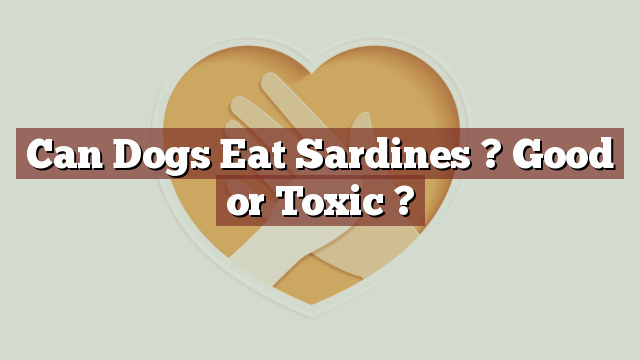Can Dogs Eat Sardines? Good or Toxic?
Knowing what foods are safe for our beloved pets is essential for their overall well-being. Today, we will explore the question of whether dogs can eat sardines. Sardines are small oily fish that are packed with essential nutrients, making them a popular choice for human consumption. But are they safe for our furry friends? Let’s dive into the topic and uncover the truth about whether dogs can safely enjoy this ocean delicacy.
Nutritional Value of Sardines: Packed with Omega-3, Protein, and Vitamins
Sardines are a nutritional powerhouse, containing high levels of omega-3 fatty acids, protein, and various vitamins. Omega-3 fatty acids, such as EPA and DHA, are important for a dog’s overall health, supporting their immune system, promoting brain development, and maintaining a healthy coat and skin. Additionally, sardines are an excellent source of protein, which is essential for muscle growth and repair. They also contain vitamins D, B12, and selenium, all of which play vital roles in a dog’s health.
Are Sardines Safe for Dogs? Experts Weigh In on Canine Consumption
Yes, dogs can safely eat sardines in moderation. According to experts and veterinarians, sardines can be a healthy addition to a dog’s diet. However, it is crucial to feed them properly and in moderation. Sardines should be offered as an occasional treat or added to your dog’s regular meal. It is important to note that sardines should be given in their plain form, without any added seasonings, salt, or oil. The bones in sardines are soft and can be safely consumed by dogs, providing them with additional nutrients like calcium and phosphorus.
Potential Risks or Benefits of Feeding Sardines to Your Dog
Feeding sardines to your dog can have numerous benefits. As mentioned earlier, the omega-3 fatty acids found in sardines can promote a healthy heart, brain, and immune system. The protein content in sardines can support your dog’s muscle development and repair. The vitamins and minerals in sardines also contribute to overall health and vitality. However, it is important to remember that sardines are a high-calorie food, so they should be given in moderation, especially for dogs prone to weight gain or with pre-existing health conditions.
On the other hand, it is crucial to be aware of potential risks associated with feeding sardines to your dog. Some dogs may have allergies or sensitivities to fish. If you notice any signs of an adverse reaction, such as vomiting, diarrhea, or excessive itching, discontinue feeding sardines and consult your veterinarian.
What to Do if Your Dog Eats Sardines: Monitoring and Recommendations
If your dog accidentally consumes sardines or you decide to introduce sardines to their diet, it is important to monitor their response. Observe your dog for any signs of digestive upset or allergic reactions. If your dog experiences any adverse effects, consult your veterinarian immediately. Additionally, keep in mind that sardines should be given as a treat or supplement, not as a replacement for a balanced dog food diet.
Conclusion: Sardines Can Be a Healthy Addition to Your Dog’s Diet
In conclusion, dogs can safely eat sardines as part of a balanced diet. The nutritional value of sardines, including omega-3 fatty acids, protein, and vitamins, can provide several health benefits for your furry friend. However, it is essential to feed sardines in moderation and without any added seasonings. As always, consult with your veterinarian to determine the appropriate portion size and frequency of sardines for your dog, especially if they have any underlying health conditions. With proper guidance and monitoring, sardines can be a healthy and enjoyable addition to your dog’s diet.
Thank you for investing your time in exploring [page_title] on Can-Eat.org. Our goal is to provide readers like you with thorough and reliable information about various dietary topics. Each article, including [page_title], stems from diligent research and a passion for understanding the nuances of our food choices. We believe that knowledge is a vital step towards making informed and healthy decisions. However, while "[page_title]" sheds light on its specific topic, it's crucial to remember that everyone's body reacts differently to foods and dietary changes. What might be beneficial for one person could have different effects on another. Before you consider integrating suggestions or insights from "[page_title]" into your diet, it's always wise to consult with a nutritionist or healthcare professional. Their specialized knowledge ensures that you're making choices best suited to your individual health needs. As you navigate [page_title], be mindful of potential allergies, intolerances, or unique dietary requirements you may have. No singular article can capture the vast diversity of human health, and individualized guidance is invaluable. The content provided in [page_title] serves as a general guide. It is not, by any means, a substitute for personalized medical or nutritional advice. Your health should always be the top priority, and professional guidance is the best path forward. In your journey towards a balanced and nutritious lifestyle, we hope that [page_title] serves as a helpful stepping stone. Remember, informed decisions lead to healthier outcomes. Thank you for trusting Can-Eat.org. Continue exploring, learning, and prioritizing your health. Cheers to a well-informed and healthier future!

